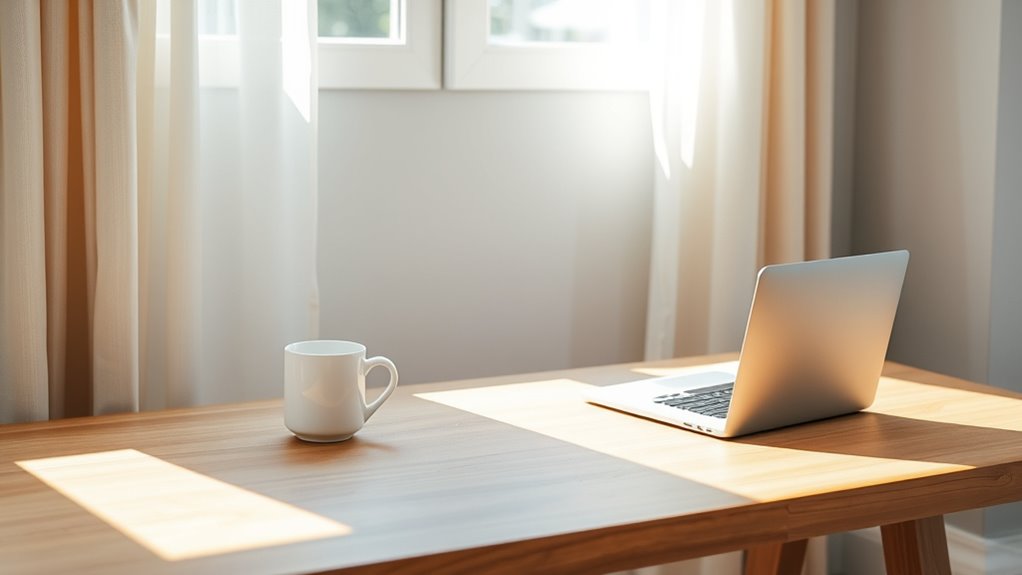Minimalism boosts your mental clarity by reducing sensory overload and easing cognitive load, which helps your brain process information more efficiently. When your environment is decluttered, you cut down on distractions, allowing your focus to sharpen and decision-making to improve. Neuroscience shows that a simplified space lowers stress and boosts emotional resilience. If you keep exploring, you’ll discover practical ways to create that calm, focused space and access your mental potential.
Key Takeaways
- Minimizing clutter reduces neural workload, allowing the brain to focus more efficiently and improve mental clarity.
- Simplified environments decrease sensory overload, enhancing attention span and decision-making capabilities.
- Organized spaces lower cognitive load, freeing mental resources for important tasks and reducing fatigue.
- Calming colors and clutter-free settings promote emotional resilience and decrease stress levels.
- Implementing minimalist routines and environments supports sustained focus and reduces mental distractions over time.
The Neuroscience Behind Cognitive Overload
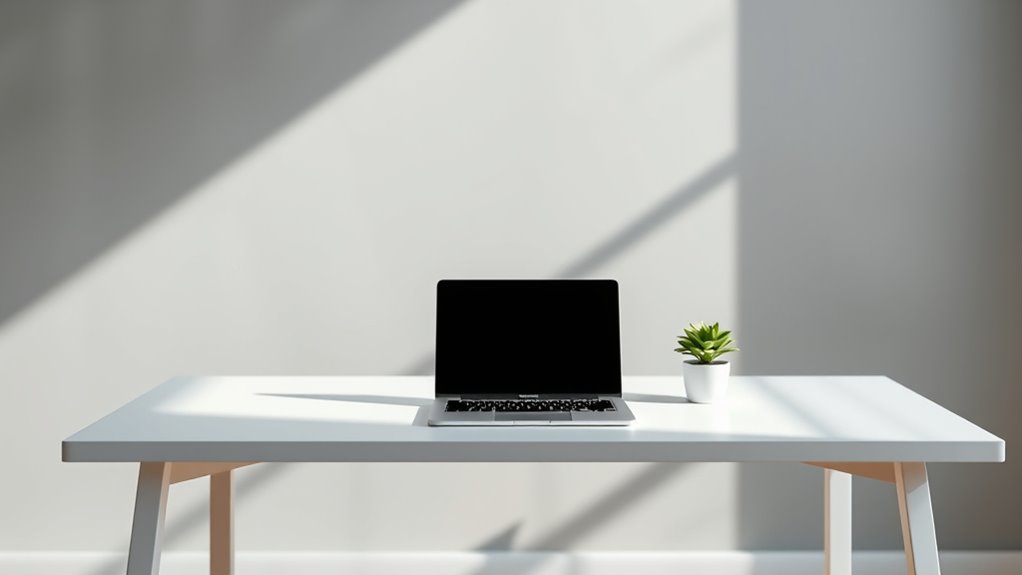
When your brain is bombarded with too much information at once, it struggles to process and prioritize effectively. This overload hampers visual processing, making it harder to distinguish important details from the noise. When your cognitive load is high, neural efficiency drops—you use more energy to perform simple tasks, leading to mental fatigue. Your brain’s capacity to filter irrelevant stimuli diminishes, causing confusion and overwhelm. By cluttering your environment or mind, you force your neural circuits to work harder, reducing overall mental clarity. Minimizing distractions allows your brain to operate more efficiently, improving focus and decision-making. This is why simplifying your surroundings and mental space can reduce cognitive overload, helping your brain function *preferably* through better visual processing and enhanced neural efficiency. Additionally, adopting a minimalist approach to your environment can prevent overstimulation, supporting optimal neural function and reducing tendencies toward cognitive overload. Incorporating focused attention practices can further help your brain prioritize relevant stimuli and improve mental clarity.
How Decluttering Enhances Brain Function
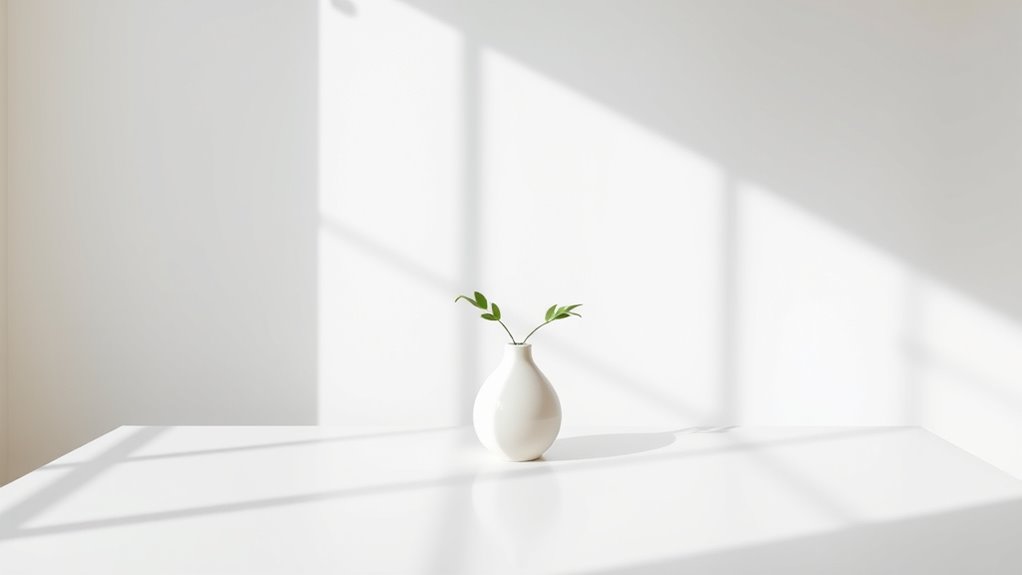
Decluttering your environment directly boosts brain function by reducing the mental effort required to manage chaos. When your space is organized, your brain can focus more on important tasks instead of constantly filtering out distractions. Color psychology plays a role here—soothing hues like blues and greens promote calmness, helping you think more clearly. Additionally, a clutter-free space strengthens emotional resilience by creating a sense of control and stability. When your surroundings are simplified, you experience less mental fatigue and anxiety, enabling sharper decision-making and improved memory. Clear environments foster a sense of accomplishment and confidence, which further supports mental clarity. Incorporating preppy dog names or other curated themes into your space can also enhance your environment’s aesthetic and promote a sense of creativity and well-being. Moreover, maintaining organization habits can sustain these mental health benefits over time. Ultimately, decluttering isn’t just aesthetic—it’s a strategic way to optimize brain function and cultivate emotional well-being.
The Impact of Minimalism on Stress and Anxiety

Have you ever noticed how a cluttered space can heighten feelings of stress and overwhelm? Minimalism reduces these feelings by creating calmer environments. Simplifying your surroundings encourages a digital detox, decreasing constant notifications and mental clutter. This shift fosters emotional resilience, helping you better manage anxiety. To illustrate, consider the following benefits:
| Benefit | Effect |
|---|---|
| Reduced visual clutter | Less mental distraction, calmer mind |
| Digital detox | Less overstimulation, more focus |
| Emotional resilience | Better coping with stress and setbacks |
Additionally, adopting a minimalist lifestyle can positively influence your mental well-being by reducing forsale 100 distractions and promoting intentional living.
Evidence Linking Simplified Environments to Improved Focus
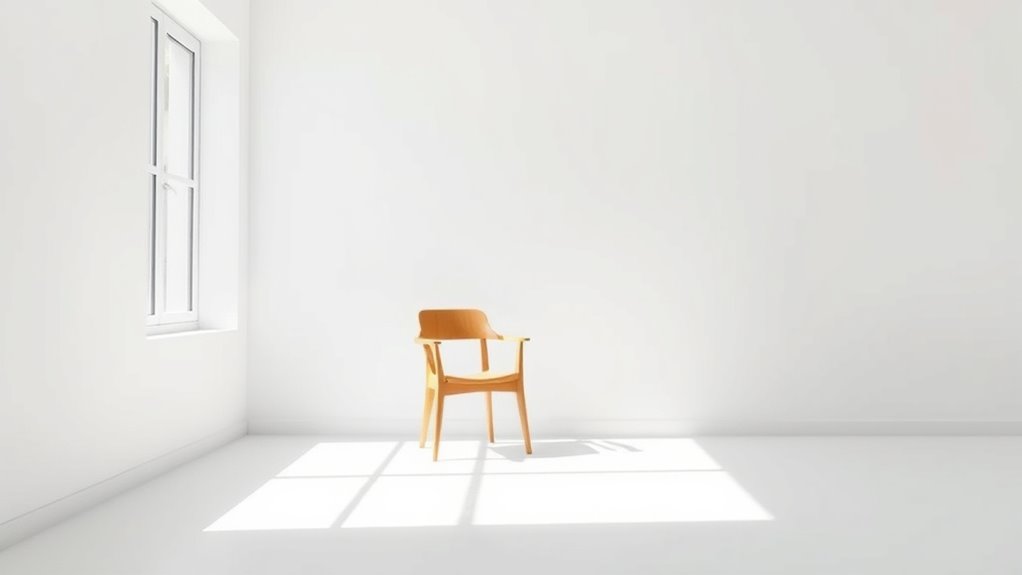
Research shows that simplified environments directly enhance focus by reducing visual distractions and mental clutter. When your space is free of excessive visual clutter, your brain can allocate more resources to the task at hand, extending your attention span. Studies indicate that cluttered surroundings overload your visual processing, making it harder to concentrate and causing mental fatigue. Neuroscience research highlights that minimalistic settings allow your brain to process fewer stimuli, leading to sharper focus and better information retention. Additionally, professional services in architecture emphasize creating spaces that promote mental clarity and well-being. By minimizing unnecessary objects and distractions, you create an environment that supports sustained attention. This link between reduced visual clutter and improved focus demonstrates how minimalist design principles can lead to clearer thinking and increased productivity. Incorporating environmental simplification can further enhance these cognitive benefits by creating more intentional and calming spaces.
Practical Steps to Incorporate Minimalism for Mental Clarity
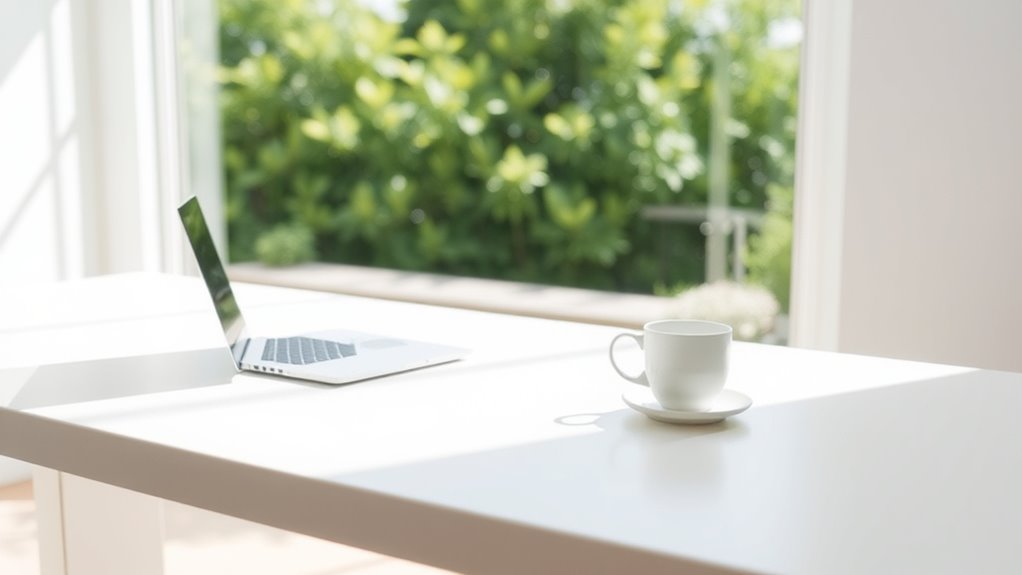
To effectively incorporate minimalism for mental clarity, start by evaluating your environment and identifying areas filled with unnecessary objects or distractions. Clearing clutter creates more mental space, reducing overwhelm and making it easier to focus. Simplify your daily routines by eliminating unnecessary tasks and commitments that drain your energy. Prioritize activities that align with your core values and bring you joy, which helps streamline your day and reduces mental clutter. Incorporate minimalism gradually—begin with one area or routine at a time—so it feels manageable. Regularly reassess your environment and routines to maintain clarity and prevent clutter from creeping back. Additionally, choosing self-watering plant pots can help reduce the time spent on plant care, allowing you to maintain a clutter-free space more effortlessly. Exploring neuroscience research reveals how reducing sensory overload can enhance your mental clarity over time. Engaging in mindfulness practices such as meditation and deep breathing can further support mental focus and emotional balance, as suggested by meditation studies. These practical steps help you foster a calmer mindset and improve your overall mental space, supporting sustained mental clarity over time.
Frequently Asked Questions
Can Minimalism Improve Creativity and Problem-Solving Skills?
Minimalism can considerably improve your creativity and problem-solving skills. By reducing clutter, you free your mind to focus on essential tasks, enhancing creative thinking. A minimalist environment fosters cognitive flexibility, allowing you to approach challenges with fresh perspectives. When you declutter your space, you create mental clarity, which helps you generate innovative ideas and adapt more easily to new solutions, boosting your overall problem-solving abilities.
How Quickly Can One Expect Mental Clarity After Decluttering?
You might notice mental clarity within days after decluttering, but it varies depending on your habits. The mental clarity timeline can be immediate or take a few weeks, as the decluttering benefits gradually become clearer. The key is consistent effort, which helps reduce mental clutter and stress. As you streamline your space, you’ll likely experience sharper focus and calmness sooner, reinforcing the positive effects of minimalism on your mind.
Are There Specific Areas of the Brain Affected by Minimalism?
You might wonder if minimalism impacts specific brain areas. It actually reduces your cognitive load, making it easier for your brain to process information. Minimalism can strengthen neural pathways associated with focus and decision-making, helping you think more clearly. By decluttering physical space, you support mental clarity and improve overall brain function, especially in regions linked to attention and executive control.
Is Minimalism Effective for Mental Health Conditions Like Depression?
Sure, minimalism might not be a miracle cure for depression, but it can certainly help you declutter your mind. By simplifying your surroundings, you encourage mindfulness practices and build emotional resilience. While it’s not a substitute for professional help, adopting minimalist habits can create a calming environment that supports mental health. Remember, sometimes less really is more when it comes to mental clarity and emotional stability.
What Are Common Challenges When Adopting a Minimalist Lifestyle?
When adopting a minimalist lifestyle, you may face challenges like overcoming emotional attachment to possessions and resisting social pressures to keep up with trends. Letting go of items that hold sentimental value can be tough, and others might judge your choices or expect you to conform. Staying committed requires strong motivation and clear boundaries, but focusing on your well-being helps you navigate these hurdles and embrace a simpler, more intentional life.
Conclusion
By embracing minimalism, you clear the clutter clouding your mind, allowing mental clarity to shine through like a bright, unobstructed sky. Simplifying your environment isn’t just about tidiness—it’s about creating space for focus, calm, and creativity to flourish. When you reduce chaos, your brain can breathe easier, releasing your full potential. So, take that first step toward simplicity, and watch your mental landscape transform into a peaceful, open horizon.
